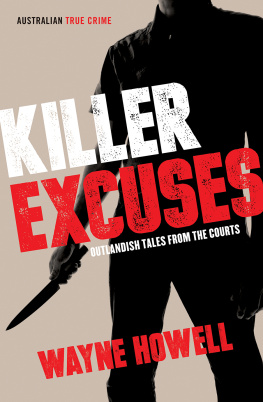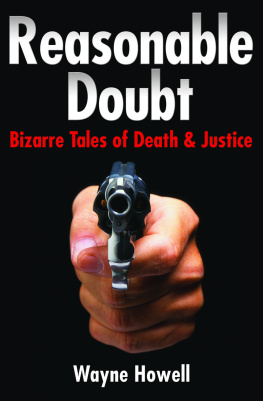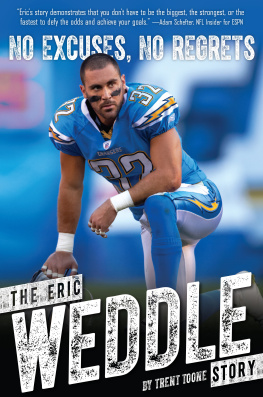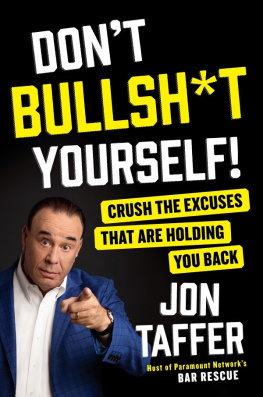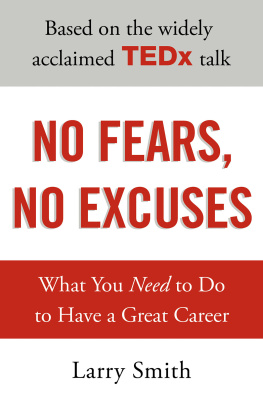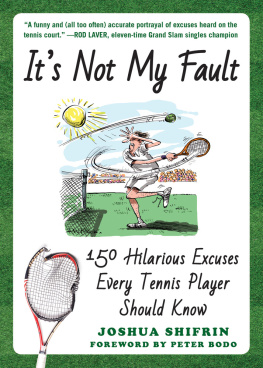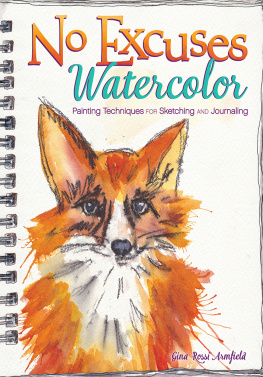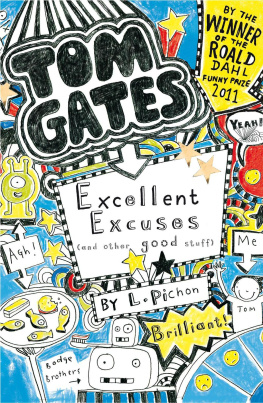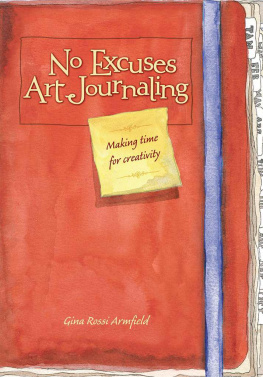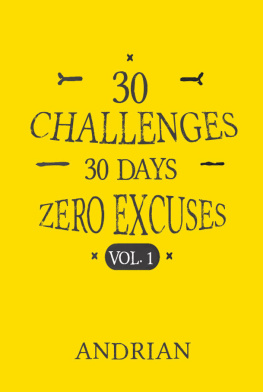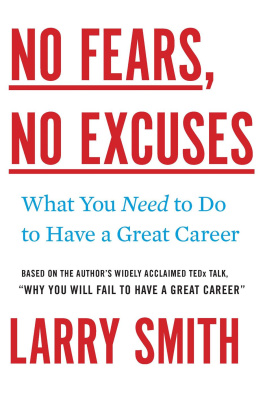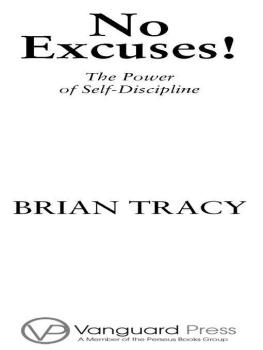Killer Excuses
Outlandish Tales from the Courts
Wayne Howell
Foreword
When I used to tell people my job mostly entailed reporting on murder and manslaughter trials, sometimes I would get a quizzical look followed by Dont you find that a bit depressing/gruesome? or Do you have nightmares?
Certainly, sometimes covering what happens inside courts can be hardparticularly watching youngsters start on a life of crime or sitting next to the grieving parents of a murder victim as they stoically listen to horrendous details of their loved ones last momentsbut mostly its intriguing.
A trial, particularly a murder or manslaughter trial, is a good place to study character because people under stress and in unfamiliar surroundings tend to drop their masks. The reason for the trialsomeones deathis stressful enough, but the pressure-cooker atmosphere created by a high-stakes adversarial contest often heats up emotions to boiling point.
Except where another source is acknowledged, the stories in this book are based on notes I took as a reporterfor the Herald Sun or Australian Associated Press and court transcripts.
Writing this book has given me the chance to tell these stories free of the time and space restrictions unavoidably a part of newspaper and news agency reporting. I hope they show that, as well as being an essential part of a civilised society, the justice system can offer insights into human nature.
Wayne Howell
Introduction
Yes, I killed her, but I was only trying to exorcise a demon from her.
Yes, I was caught beside her shallow gravewearing a blond wigbut she died accidentally, hitting her head on an armchair when I pushed her away.
Yes, I stabbed her to death in our front yard while neighbours looked on, but she provoked me by neglecting her traditional wifely duties.
Yes, I shot him in the head, but I was only following a gangsters orders.
Yes, I shot him while he was out walking his dog in the woods, but I thought he was a deer.
Yes, I stabbed my father and stepmother while chasing them down the street, but I was out of my mind thanks to a Sambuca-laced espresso.
Yes, I stabbed her to death, but after decades of nagging, I finally snapped when she called me a mong again.
Yes, I drowned her, but we were just having sexin the sea.
Yes, I put a plastic bag over her head and suffocated her, but only because I loved her.
Killerslike school students trying to dodge punishment for not doing their homeworkhave come up with an encyclopaedia of excuses. Down the ages teachers have struggled to stifle giggles when listening to the likes of: The dog ate it, I left it at home in the rush to get to school, My little sister tore it up, or I thought you said it was for next week. But the excuses proffered by those who have killed a person are in a different league to those of lazy students.
Very few people want to admit to murderthe deliberate, unlawful, inexcusable act of killing of another human being. The threat of being branded a murderer, of being locked in jail for a long, long timeeven a lifetimetends to concentrate the mind on a search for a way out, an excuse.
For many people who have killed someone, finding an excuse is not just about avoiding punishment. Often, they cannot admit their guilteven to themselves. They cannot accept that they belong to one of the most despised groups in societymurderers.
Most murder trials are not whodunits. The accused is not saying, It wasnt me. Youve got the wrong guy/gal. He or she is telling the jury, Yes I killed. I caused the death, but I am not a murderer. I did not commit murder.
Most murder trials are whydunits. Why did the dead person die? Why did the accused cause the death of the deceased? Thats where the killer excuses come in.
There are the excuses that get you off completely. The favourite is that you killed to defend yourself. A much more rarely used one is that you were acting like a robotyour mind was not controlling your actions. Killers have also tried the acting under orders excuse. This one was used most famously by the Nazis in the Nuremberg trials after World War II.
Then theres the insanity excuse, which is not quite so popular because you may be sentenced to a long time in a psychiatric hospital. Fans of the film One Flew Over The Cuckoos Nest would be particularly reluctant to use this one. (In the classic film, Jack Nicholson plays a larrikin criminal who successfully pretends to be insane so he can be sent to a psychiatric institution. Its a ploy he lives to regret.)
Theres also the complete accident excuse. As in: How could I have known the rope I used to tow my car up a hill was too flimsy? How could I have known it would snap and send my driverless car careering fatally into an old lady?
Other excuses do not get killers off completely but, if accepted by a jury, can get murder reduced to manslaughteroften cutting jail time by about 10 years. Implicit in most of these excuses is the idea that you did not really mean to killor seriously injurethe dead person. Maybe the sex went too far. Maybe the person you killed made you so angry, you just snapped. You couldnt help yourself. You just lashed out and the next thing you knew he or she was dead. Maybe your wife of 23 years told you that sex with you repulsed her. Maybe years of nagging or abuse by the dead person finally triggered an explosion of mindless and deadly violence.
Probably the toughest excuse of all for the justice system to deal with is the killer whose excuse is love: Yes I killed my wife deliberately and intentionally but only because I loved her so much. She was in such pain and she begged me to do it, so I did.
Its a very human thing to try to avoid punishment. It is even more deeply human to be reluctant to accept that you are not a nice person, that you are instead one of the worst sorts of people going arounda murderer.
The stories in this book tell how people who have killed others have tried to excuse their actions. Some, you might think, are just try ons akin to some of the more ludicrous excuses teachers hear from lazy students. Others, however, appear to be genuine attempts to explain why they caused someones death.
Whydunit trials in some ways have more human drama than whodunits. When the accused says, Sure that person was murdered but youve got the wrong person. I didnt do it, their trial is most often dominated by white-coated forensic teams talking about fingerprints or DNA evidence, or tricky lawyers trying to demolish their alibi evidence or catch out the accused lying. When the accused says, however, Sure I killed and it looks like murder but its more complicated than it looks. I have a really good reason/excuse/explanation, the trial is more often than not dominated by psychologists and psychiatrists.
Whodunits demand clever, analytical detectives like, say Sherlock Holmes or Inspector Colombo. Whydunits, on the other hand, demand commonsense, empathy and an understanding of human nature with all its failings. Juries in whydunit trials are being asked to decide what our society should condemn and what it should be prepared to accept and forgive.
PART 1
I am NOT guilty
Excuse 1
I was exorcising demons
Fighting Demons With Gladwrap
When Joan Vollmer let out one final groan and died, her devoutly Christian husband was pinning her to a chair and two family friends had their fingers in her mouth. The 49-year-olds eyes were also being held opento make sure she watched as a bible-wielding 22-year-old exhorted a demon to name itself and go to the foot of the Cross.

